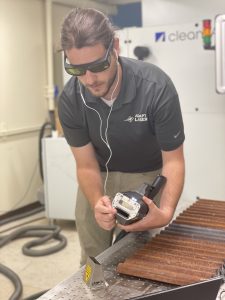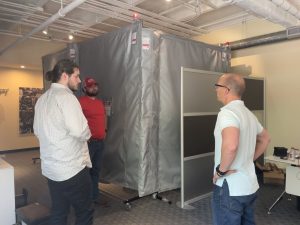Laser ablation is a safe and efficient method of cleaning especially when compared to more traditional processes like media blasting or chemical dipping. However, as with any complicated piece of machinery our laser cleaning systems do come with some safety hazards. This is why having a designated laser safety officer at your facility is strongly recommended, especially when using a class 3B or class 4 laser. In order to properly train individuals on laser safety we have our own on-site certified laser safety officer who trains all of our employees on laser safety practices.
WHAT IS A LASER SAFETY OFFICER?
A laser safety officer (LSO) according to ANSI Z136 Standards published by the Laser Institute of America, is “an individual designated by a company, university, or government institution, who has the responsibility to monitor the safe usage of lasers in a work environment by defining the proper control measures according to the different levels of laser hazards.”
This person is typically an engineer or an environmental health physicist with experience in the field of laser measurement and applications. Many LSOs also possess management skills that help as they work to enforce proper control measures and make informed decisions if complications with the laser or surrounding area arise.
Specific duties and responsibilities of laser safety officers:
- The establishment of a laser safety program
- Classify or verify the classification of lasers/laser systems
- Approve standard operating procedures
- Implement control measures to evaluate hazard in work areas
- Recommend/approve laser protection equipment
- Assure that proper laser safety training is provided
- Perform laser safety audits
- Perform medical examinations and investigate accidents
WHEN IS A LSO REQUIRED?
ANSI Z136.1 specifies that any facility using Class 3b or Class 4 lasers or laser systems should designate a Laser Safety Officer to oversee safety for all operational, maintenance, and servicing situations. Within these standards are breakdowns of specific requirements that we recommend checking to see if your facility falls under that dictate if an LSO is required.
WHY HAVE A LSO?
Our own Certified Laser Safety Officer, Tyler O’Neill, strongly recommends designating a LSO, as it helps foster ownership over the system and safety measures. It also ensures that all operators are aware of the safety hazards and are properly trained on how to handle them.
LSOs are also in charge of calculating the nominal optical hazard distance (NOHD) for diffuse reflections for a certain laser, fiber optic and intrabeam viewing conditions, define temporary class 4 enclosures around lasers when technicians need to work in intrabeam condition for maintenance, and generally provide calculations of the maximum levels of accessible radiation during operation, maintenance and service. They may also keep a list of where equipment is located and when the last maintenance was performed.
WHAT IS A CLSO?
If an individual meets specific requirements, they can pursue becoming a Certified Laser Safety Officer (CLSO). To become a CLSO you’ll need to pass the eligibility requirements and then apply for the exam. Some of the eligibility requirements include: having operated a laser in a professional setting for a least one year, have some form of documented secondary education, a certificate of completion from a Board of Laser Safety approved LSO training course, and 2 letters of recommendation from the applicant’s supervisor stating the applicant has performed specific responsibilities of the LSO.
BOARD OF LASER SAFETY
CLSO certification is managed by the Board of Laser Safety who has been offering this program to laser safety officers, medical and non-medical, for over 15 years. The CLSO program was started as a way to provide a means for the recognition of laser safety professionals through certification. As stated by the BLS, “BLS certification will enhance the credibility of a designated laser safety officer, and demonstrate that individuals serving in the field of laser safety have agreed to adhere to high standards of safety and professional practice.”
The BLS provides a current list of all active CLSOs (Certified Laser Safety Officers) and CMLSOs (Certified Medical Laser Safety Officers) on their website. If you scroll about two-thirds down the list of CLSOs, you will find Adapt Laser’s very own, Tyler O’Neill.
 ADAPT’S CLSO: TYLER O’NEILL
ADAPT’S CLSO: TYLER O’NEILL
Tyler graduated from the University of Missouri—KC in 2017 with a mechanical engineering degree and was immediately hired by us to help manage our applications lab. In his five years here, Tyler has helped organize and leads our entire internal laser safety training program. This includes developing materials that we use in on-site laser safety and maintenance courses as well as the responsibility of training all of our employees—engineers, service technicians, marketing & sales employees, office admins, executives, and all else—on the basics of laser safety.
Tyler’s been a CLSO for just under three years, meaning he is coming up on his certification update this fall. For anyone looking to become a CLSO, Tyler recommends a full week-long, in person training program instead of an online option, to help fully grasp all of the laser safety terminology and equations. He mentions that the test is difficult, but similar to the ACT, so prepare similarly to how you would for that sort of standardized test.
As stated earlier, Tyler strongly recommends that any facility using a class 3B or class 4 laser have a designated LSO. If a company is wanting to go even further in their efforts towards practicing the highest level of safety standards, they can look into their LSO becoming a CLSO.
WHATEVER YOUR NEEDS, ADAPT LASER HAS THE SOLUTION FOR IT
Adapt Laser specializes in providing the highest-quality laser cleaning systems available. Our systems come in both handheld and automated options making them versatile for different applications and surface preparation. We offer formal laser operations and safety training to ensure both you and your employees get the most out of their laser cleaning system. Over the past 15 years we have equipped numerous companies across varying industries with our state-of-the-art laser cleaning solutions.
If you’re looking for a faster, totally unique industrial cleaning and coating removal process, contact us today or call (816) 466-5855 to find the right laser cleaning system for you.
Like us on Facebook, connect with us on LinkedIn, and subscribe to us on YouTube

